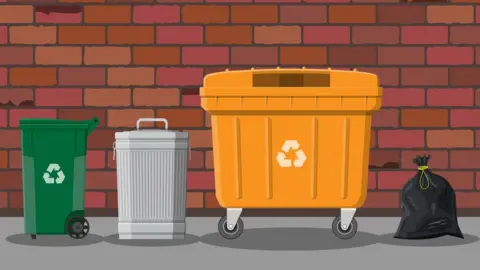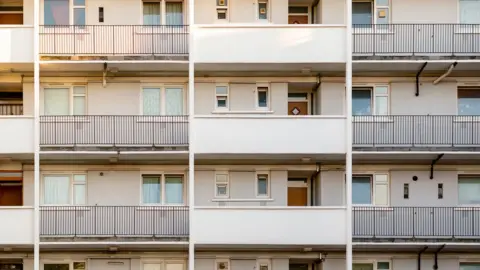Northamptonshire: What do councils legally have to do for their residents?
 Getty Images
Getty ImagesAs cash-strapped councils propose stripping back their services to the "legal minimum", BBC Reality Check asks what councils in England have to do for their local residents.
They provide a sometimes bewilderingly wide range of services, but not all of these are things they have to do by law. There are over a thousand legal obligations on councils, although many of them are vaguely worded and open to interpretation.
When faced with financial pressure, functions they are not legally obliged to carry out are often the first to be cut.
And local government has seen a 49% reduction in the funding it receives from central government since 2010.
The Ministry of Housing, Communities and Local Government acknowledges that "all of the public sector has had its part to play in helping to reduce the deficit, and we know that councils have been going the extra mile to deliver efficiencies" but it says "we are providing councils with £90.7bn over the next two years and are giving them more powers to retain the growth in business rates".
Adult social care
Demographic changes mean over the next 15 years, the population over the age of 85 is likely to increase by 1.3m, meaning more people who are likely to need care and support in their day-to-day lives.
And this is one of the biggest challenges facing councils which have been spending a growing proportion of their budgets on social care.
Councils have a legal duty to make sure care is available for people who are unable to do certain things in their daily lives - getting themselves up and dressed, cooking or taking medication for example - without help.
That includes older people and anyone with a disability or condition that makes these things difficult. The care might be provided by the council itself or by a charity or private company, in a care home or in the person's own home.
That doesn't mean councils have to pay for all of this care, though - unlike the NHS, councils can charge people for care, unless their income is below a certain level.
Children's services
Councils have around 200 legal obligations in relation to children, including ensuring that they have a school place and that classes don't exceed a certain size.
They have duties to assess and provide services for children with special educational needs and disabilities, and young people who were previously in care, among other things.
Local authorities must assess whether a child referred to them is in need of support due to disability or illness, a parent's disability or illness, low income, abuse or neglect.
They must also investigate cases where a child is considered to be at risk of significant harm and put a plan in place to keep that child safe. In the most extreme cases they must intervene to remove a child from its parents.
Bins
Councils are obliged to arrange for the collection of household waste, although there's nothing to say how often they must collect bins.
This has allowed some councils to shift to fortnightly - rather than weekly - collections.
Rules on recycling are clearer and there are legal targets in place, some of which require each council to collect at least two types of recyclable waste and to push for recycling rates of at least 50%.
 Getty Images
Getty ImagesRoads
Councils are obliged to maintain local streets so they are safe to use. That includes the surface of the roads, as well as lighting and traffic signals.
This duty has been interpreted by judges as meaning that roads must kept in a condition that's safe to use in all seasons - including taking reasonable steps to make sure road-users aren't endangered by snow and ice.
And councils have been taken to court for failing to do so when it resulted in someone being injured.
So does that mean they are legally obliged to fix potholes? Well, they could be open to a legal challenge if someone gets hurt as a result of their failure to maintain the roads, and they cannot prove they'd taken "all reasonable care" to ensure it was safe for road users.
Housing
Local authorities must provide free advice for people at risk of becoming homeless, and accommodation for homeless people in "priority" groups.
They must also provide facilities for disabled people in their houses and work with the fire service to ensure that buildings adhere to general health and safety regulations.
 Getty Images
Getty ImagesPublic health
In 2013, councils in England were given new responsibilities to improve the public health of their local area.
They must make sure sexual health, drug and alcohol misuse and smoking cessation services are provided.
And they must take steps to help people live healthier lifestyles - providing advice about healthy eating and exercise, or encouraging people to stop smoking during pregnancy, for example - as well as minimising risks to their health from their environment, for example improving poor housing.
Councils also have to make sure arrangements are made to protect their local residents' health against things like infectious disease, environmental hazards and extreme weather events.
Libraries
Local authorities are required to maintain a "comprehensive and effective" library service, but this commitment is also to be done "within available resources."
However, what counts as comprehensive is up to interpretation - in 2014 it was decided that it did not mean that "every resident lives close to a library", but that an authority was "delivering a service that is accessible to all residents using reasonable means, including digital technologies".
They can also hand over the running of libraries to volunteers, rather than pay for it.
Residents can demand an inquiry if they feel a local authority is not doing enough to promote the improvement of libraries.
Libraries are a bit of a special case - there's no law that says councils have to provide parks or many other leisure facilities.
There are hundreds of other things councils are responsible for, from registering births and deaths to issuing licences to pubs and clubs.



